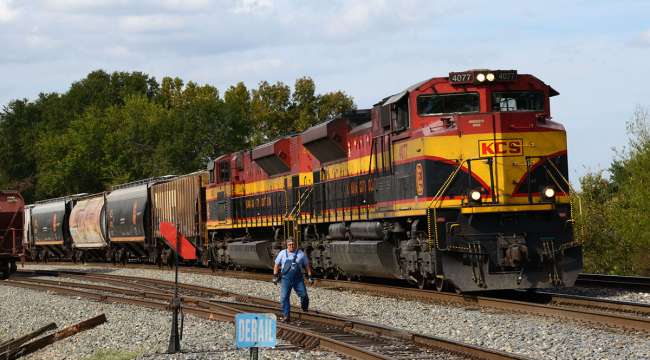Kansas City Southern Revenue, Profits Rise

Kansas City Southern announced a significant uptick in profits in the fourth quarter, but similar to virtually all U.S. companies, the final total was bolstered by the savings anticipated from the Tax Cuts and Jobs Act.
The Class I railroad generated $551.7 million in profits, or $5.33 per share, up from $129.6 million or $1.21 one year ago. However, within the results was a $359.2 million tax benefit tied to the law slashing tax rates for ‘C’ corporations to 21%.
Nevertheless, Kansas City Southern reported a 16% increase in profits to $193.2 million, excluding the tax benefit, a total that focuses on core business conditions. And if an investor applied the old tax rate, then net income would’ve been about $151.9 million or $1.47 per share, a 17% increase year-over-year.
Revenue improved 10% to $660.4 million in the quarter and overall volume was up 5%/
For the full year, revenue climbed 11% to $2.6 billion, volume increased 5% and net income, excluding taxes, jumped 32% to $874.3 million.
Chief Financial Officer Michael Upchurch noted that the impact of the tax reform is more complicated on Kansas City Southern since it’s a multinational company with a significant presence in Mexico.
“The overall benefits we expect to see from lower tax rates and from immediate expensing of capital expenditures, which were offset by the negative impacts of a one-time repatriation tax and other foreign income inclusion provisions,” he said on an earnings conference call. “We expect to incur a one-time repatriation tax of $177 million, which represents approximately $1.5 billion of cumulative foreign earnings of our international subsidiaries.”
Kansas City Southern CEO Patrick Ottensmeyer focused some of his prepared remarks on the upcoming NAFTA negotiations in Montreal.
“If there would be a collapse or withdrawal of NAFTA, the immediate safety would be WTO [World Trade Organization] rules and tariffs would apply to those commodities and products that are covered by NAFTA. Those are not horrible, [and] oddly enough are more punitive to U.S. exports to Mexico, particularly grain, than they are to imports from Mexico to the U.S.,” he said. “Furthermore, approximately 60% of trade between the U.S and Mexico today doesn’t have a specific connection to NAFTA, so we would assume the biggest commodity group in that category would be energy and we would assume that portion of the trade between the U.S. and Mexico would not be affected.”
Within the company, intermodal revenue went up 5% to $97.4 million and carloads increased 7% to 258,500. However, revenue per carload slipped 2% to $377 in the quarter.
For the full year, intermodal revenue and carloads improved 2% to $363.8 million and 975,100, respectively, but revenue per carload dropped 1% to $373.
Petroleum transportation was one of the other standouts within the commodity portfolio. For the quarter, petroleum revenue jumped 55% to $48.8 million, carloads rose 40% to 24,700 and revenue per carload increased 11% to $1,976.
Automotive transportation revenue improved 15% to $60.6 million, carloads went up 5% to 40,900 and revenue per carload grew 9% to $1,482.
“I think we’re very solidly grounded in reality based on the best information that we have today. Ninety percent of our business in commodity portfolio looks like it’s going to be positive for 2018, with the only exception being energy, where we’ve had a major plant closing that is just going to be hard for us to overcome,” Ottensmeyer said.




